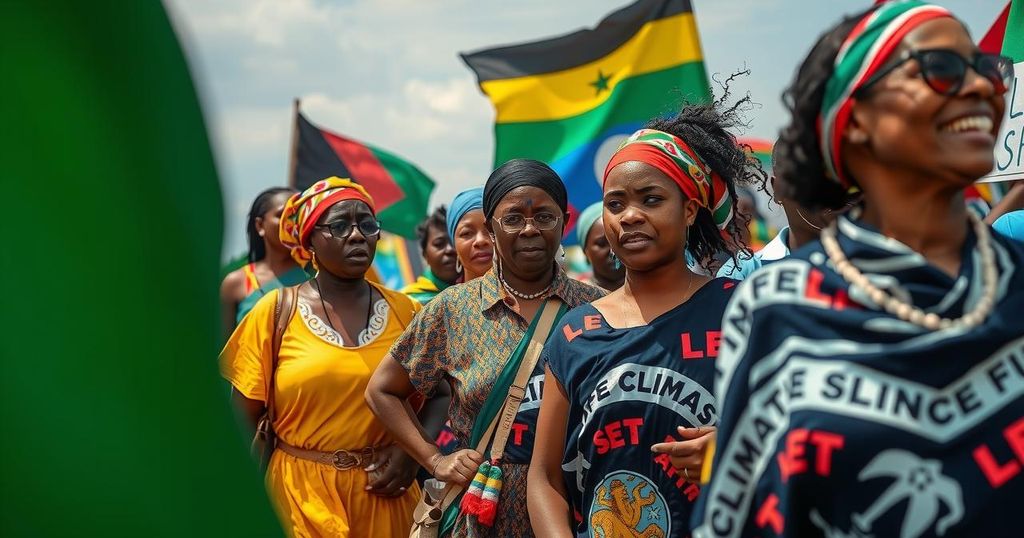A group of 50 Senegalese women climate activists marched in Dakar, advocating for climate justice and demanding pollution-reducing actions from major emitting countries ahead of COP29. They highlighted the devastating impacts of recent floods and called for compensation and adherence to the Paris Agreement, emphasizing the responsibility of heavily polluting nations towards Africa, which contributes minimally to global emissions yet suffers greatly from climate change effects.
On Saturday, a group of approximately 50 women climate activists marched through the streets of Dakar, Senegal, advocating for climate justice and urging major pollutant nations to reduce their greenhouse gas emissions in anticipation of the upcoming UN Climate Change Conference (COP29) scheduled for November 11, 2024. This annual demonstration has been held since 2021 and carries particular significance this year due to escalating climate-related impacts on Senegal. The participants rallied with impassioned slogans such as “Down with capitalism! Down with polluting countries!” and displayed banners demanding the protection of Senegal’s natural resources while calling for a transition to a decarbonized future. Cheikh Niange Faye, a former tour guide from the Thiès region of Senegal, expressed frustration over the lack of progress, stating, “It’s been four years that we’ve been marching, and nothing’s changed. They’re spending billions to do their conferences, but they owe us billions in compensation.” This sentiment reflects the growing discontent among rural women, particularly in light of recent flooding that has significantly impacted communities across the country. The Sahel region, including Senegal, has experienced unprecedented flooding recently, affecting tens of thousands of individuals and damaging over 1,000 hectares of crops. Activists argue that the nations contributing most to global emissions bear a moral responsibility to support Africa, which is severely affected by climate change while only contributing 3.8% of global greenhouse gas emissions, according to data from the Carbon Disclosure Project. Khady Camara, the primary organizer of the women’s climate march, articulated a call for accountability from nations ahead of COP29, specifically urging adherence to the commitments outlined in the Paris Agreement. Khady Faye, another noteworthy environmental activist from the Saloum Delta region, highlighted the environmental degradation resulting from offshore drilling activities, such as those occurring at the Sangomar oil fields. She poignantly remarked, “Think about the suffering of these communities, think about the suffering of these women. Try to leave our delta alone, try to leave the gas at Sangomar underground, to let the community live normally.”
The climate justice movement in Senegal, particularly led by women activists, has gained momentum as communities increasingly confront the severe impacts of climate change. The periodic marches highlight grievances against developed nations largely responsible for greenhouse gas emissions while advocating for reparative measures owing to the disproportionate effects of climate change on African nations. With COP29 approaching, activists view this as a pivotal moment to galvanize international awareness and action to protect vulnerable regions facing catastrophic flooding and other climate-related disasters. The issue of fossil fuel exploration, particularly offshore drilling, has emerged as a critical concern, complicating the fight for sustainable and equitable development in Senegal.
The march in Dakar exemplifies the growing urgency among Senegalese women to demand accountability from the world’s leading polluters. Their collective voice serves as a powerful reminder of the immediate need for climate justice, advocating for reparations and protective measures for those most affected by environmental degradation. The emphasis on community activism, particularly from rural women impacted by climate change, underscores a broader narrative of resilience and advocacy in the face of global inaction. As COP29 approaches, the sentiments expressed by these activists should resonate with policymakers and international leaders, highlighting the critical importance of adhering to climate commitments and addressing historic inequities in global ecological stewardship.
Original Source: abcnews.go.com







